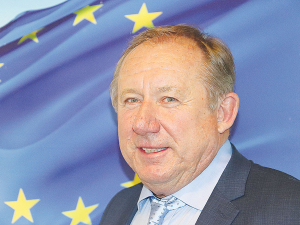Subsidies keeping wind, solar generation viable
OPINION: I recently wrote an open letter to the Prime Minister because at a recent Federated Farmers meeting, Chris Luxon told me wind and solar generation is not subsidised.
 Wolfgang Burtscher, the EU’s head of the Agricultural Directorate, says there are trade-offs as to who and what is the most sustainable.
Wolfgang Burtscher, the EU’s head of the Agricultural Directorate, says there are trade-offs as to who and what is the most sustainable.
One of the most difficult terms to define today is sustainability.
That's the view of the EU's head of the Agricultural Directorate Wolfgang Burtscher, who was in NZ recently for talks with senior agricultural officials, including MPI director general Ray Smith.
During his brief stay, Burtscher also visited farms in the Wairarapa and took part in a special forum organised by the EU Ambassador to NZ, Nina Obermaier - attended by EU diplomats, senior NZ government officials and agricultural leaders.
Burtscher told Rural News in an exclusive interview that in addition to the broader aspects of environmental ecological sustainability, there is also an aspect of social sustainability that ensures farmers receive an income for their labours - as well as maintaining vibrant rural areas. He says there are trade-offs that need to be made and a question mark as to who and what is the most sustainable.
"Just look at the example of who is more sustainable - an intensive farmer or an extensive farmer," he explains.
"If you are looking at greenhouse gas emissions, maybe the intensive farmer is better because they are able to capture all the emssions in their stable.
"However, in terms of biodiversity, an extensive farmer who maintains the land and takes care of their hedges or stone walls is more biodiverse. Now who is the sustainable farmer?"
Burtscher adds that in Europe they have some certification systems where one is deemed more sustainable if they produce less greenhouse gases. But says other factors include animal welfare and biodiversity preservation.
"To some degree, both are right and that's why I find this whole subject so challenging."
Burtscher says Europe has lost over five million farmers and he points out that the average farm size there is just 17ha. But he adds that people still have to eat and that's why farming is so important to any country.
Burtscher believes there is also more to farming than just producing food and while some farmers may just be producing for self-sufficiency, they still play an important role in keeping rural communities alive and functioning.
"Competitiveness is not the only yardstick to measure the importance of farming."
Burtscher says that's why the EU subsidises its farmers - because of the other benefits they bring.
Worldly Issues
At the forum, a number of issues facing farmers worldwide were discussed.
These included environmental matters – especially climate change and the fact that productive land is being gobbled up for urban development. Another issue that drew much comment was the role that consumers and buyers of primary products play in determining aspects of farming systems and sustainability.
Burtscher raised the issue of food security in individual countries – a phenomenon he says has arisen because of Covid-19 and the Russian invasion of Ukraine. He believes this has raised the reputation and heightened the recognition of the important role that farmers play in society.
Burtscher says while there is pressure for farmers to become more sustainable, the fact remains that they need to be fairly compensated for their efforts so that they can remain economically viable.
“In the context of the Ukraine crisis and repercussions in Europe and in NZ, we have seen a huge increase in the price of energy and fertiliser and other inputs,” he explains. “These cost increases have led to increased food prices."
Burtscher questions whether farmers are being fairly rewarded for their products and reckons this is a role that governments must play worldwide to closely monitor what is happening in this area.
The Meat Industry Association of New Zealand (MIA) today announced that Chief Executive Officer Sirma Karapeeva has resigned from the role.
The winners of the 2026 Hawke’s Bay/Wairarapa Dairy Industry Awards were announced at the annual awards dinner held at Copthorne Solway Park in Masterton on Thursday evening.
Environment Southland is welcoming this week’s decision by the Environmental Protection Authority (EPA) to approve the release of Blaptea elguetai, a leaf‑feeding beetle that will help control the highly invasive Chilean flame creeper.
This March, the potato industry is proudly celebrating International Women’s Day on 8 March alongside the International Year of the Woman Farmer, recognising the vital role women play across every part of the sector — from paddocks and packhouses to research, leadership, and innovation.
Fruit trader Seeka posted a record profit and returns to shareholders in 2025.
Recent weather events in the Bay of Plenty, Gisborne/Tairawhiti, and Canterbury have been declared a medium-scale adverse event.

OPINION: A mate of yours truly reckons rural Manawatu families are the latest to suffer under what he calls the…
OPINION: If old Winston Peters thinks building trade relations with new nations, such as India, isn't a necessary investment in…